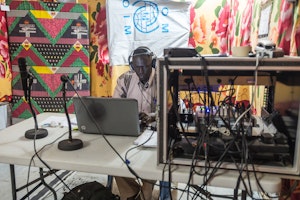Court Clears the Way for Greater Press Freedom in Africa
By Peter Noorlander
In its first judgment on the issue of free speech, the African Court on Human and People’s Rights ruled on December 5, 2014, that imprisonment for defamation violates the right to freedom of expression.
The watershed judgment was handed down in the case of Konaté v. Burkina Faso, which was brought on behalf of Lohé Issa Konaté, the editor of the newspaper L’Ouragan (The Hurricane). Konaté was jailed on November 1, 2012, for reports in which his newspaper accused a prosecutor of corruption. He spent a year in prison and his paper was forced to fold.
Thanks to the court’s decision, Konaté will now be entitled to compensation for the time he was incarcerated and for the income lost through the closure of his newspaper. Burkina Faso was ordered to change its criminal defamation laws.
The ruling will have ramifications far beyond the country’s borders, however, and could cultivate a freer, stronger, and more effective press throughout the continent. Many African countries have laws that threaten prison for defamation; the implication of the Konaté judgment is that these laws are now invalidated. This will be welcome news not just for journalists but also for bloggers, political activists, and human rights defenders who expose hard truths all over Africa.
The African Union Special Rapporteur on Freedom of Expression, Pansy Tlakula, has already welcomed the judgment as a “landmark decision that will … pave the way for the decriminalization of similar laws such as insult laws and publication of false news.” Nani Jansen, legal director for the Media Legal Defence Initiative (MLDI), called the ruling “justice for Konaté,” and announced that MLDI would bring more cases before other international courts to invalidate similar criminal laws that restrict press freedom.
Konaté was represented by lawyers from MLDI, who had supported him in Burkina Faso and brought the case to the African Court as a matter of last resort. Jansen led a legal team that included British international criminal law specialist John Jones QC and leading international arbitration lawyer Steven Finizio, both of whom took the case pro bono. They argued that the court should rule not only that Konaté’s rights were violated—he had excellent sources for his report, which he was prevented from bringing before the local courts—but that as a matter of course, no journalist should ever be imprisoned for defamation.
This argument was supported by a coalition of human rights and media freedom groups that participated in the proceedings before the African Court and stated that the threat of prison created a chilling effect.
Konaté, for his part, was delighted with the outcome. Having spent a year behind bars simply for publishing an article, he finally feels that he has been vindicated. Outside the courthouse, he said that “the African Court has recognized the injustice I have suffered. Not only am I happy from a personal point of view, but also because this decision will have positive implications for all my fellow journalists who face great risks, including, as I did, imprisonment for reporting on issues that matter. This is a victory for the entire profession.”
The Media Legal Defence Initiative is a grantee of the Open Society Foundations.
Peter Noorlander is CEO of the Media Legal Defence Initiative.
